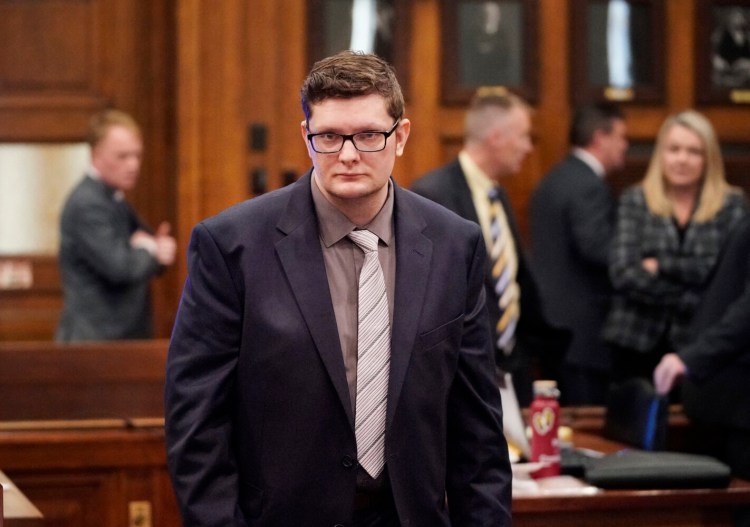Heather Gilbert sat on the witness stand in the Cumberland County Courthouse, describing a conversation she had with her younger sister nearly four years ago.
“She didn’t really say much,” Gilbert said. “It was kind of like, if we believed in divorce, we wouldn’t be married right now.”

Alicia Gaston Press Herald file photo
Within weeks, her sister would be dead.
Noah Gaston fatally shot Alicia Gaston in a stairwell in their home before sunrise on Jan. 14, 2016. He has said he believed his 34-year-old wife was an intruder, but prosecutors have argued that he intended to, or at least knew, he would kill her. A grand jury indicted Gaston on charges of murder and manslaughter, and he has been held without bail since his arrest.
Now 37, Gaston is on trial this week at the Cumberland County Courthouse. The opening statements and testimony Wednesday echoed the only day of Gaston’s first trial, in February, when the judge declared a mistrial.
Assistant Attorney General Meg Elam told the jury that forensic evidence like soot and blood splatter would show that the couple were only 18 inches apart at the time Noah Gaston fired the gun. She said Gaston changed his story about what he could see and where the figure on the stairs was when he pulled the trigger. And she recounted a conversation between Gaston and two church friends who picked him up from the police station and told them about them shooting.
“When he finished his story, Noah Gaston said to the two, ‘That’s what I have to say if I want to see my kids,’ ” Elam said.

Assistant Attorney General Meg Elam speaks to the jury during opening statements Wednesday. She called the death of Alicia Gaston “a killing without justification.” Gregory Rec/Staff Photographer
Elam said the evidence would show Gaston could see that his wife was on the stairs when he shot her.
“This was a killing without justification,” Elam said. “This was a crime.”
Defense attorney Rob Andrews said Gaston acted out of fear and a desire to protect his family. He said Gaston heard noises downstairs, checked on his children and then got his gun to confront an intruder.

Rob Andrews, attorney for Noah Gaston, speaks to the jury Wednesday during opening statements in Gaston’s trial. He told jurors “you shouldn’t trust what the state of Maine says.” Gregory Rec/Staff Photographer
“He made his way, loading the gun as he went – bang – the gun went off,” Andrews said. “And with the discharge ringing in his ears, Noah realized that it was his wife falling back down those stairs. He dropped the gun and he went to her.”
Andrews accused investigators of ignoring evidence to advance a theory of domestic violence.
“I’m going to argue that you shouldn’t trust what the state of Maine says,” Andrews said. “Because when this evidence is all in, I think you’ll understand how the evidence has been manipulated and how the people who have been asked to speak are either ignoring important facts or have chosen to intentionally disregard them.”
Gaston wore a blue suit and sat quietly next to his attorneys. At times, like when the prosecutors played a recording of his own 911 call, he pushed his glasses up and wiped tears from his eyes.

Noah Gaston wipes away tears after Assistant Attorney General Meg Elam’s opening statement Wednesday in Gaston’s second murder trial. Gaston is charged in the 2016 killing of his wife, Alicia Gaston, in their Windham home. His first trial ended in a mistrial. Gregory Rec/Staff Photographer
The new jury is eleven men and four women; their group includes three unidentified alternates. The same witnesses took the stand as during the opening day of the first trial.
Gilbert, the victim’s sister, spoke about financial stresses for the Gaston family but said she never knew about any physical violence in their home.
“Alicia was very loving toward him,” Gilbert said. “She expressed love by doing everything she could to make the marriage work, to make the house stay afloat.”
Most of the people who testified were police and paramedics who responded to the Brookhaven Drive house that day. The jurors also listened to another audio recording from the body microphone of a Windham police officer who was at the house and spoke to Gaston. Office Justin Hudnor asked Gaston what happened, and they went over the incident more than once.
At one point, Gaston said his wife had turned a corner at the bottom of the stairs when he got to the top of the stairwell. Then, he seemed to correct himself.
“I don’t think that’s accurate,” Gaston said on the recording. “I think when I got to the top of the stairs with the gun, I don’t think there was anyone on the stairs. I don’t think she had started. And by the time I kind of raised the gun, she was like halfway up the stairs or something, or a couple stairs up.”
Both sides honed in on this moment as they cross examined Hudnor.
“It is possible that he was inferring things?” Andrews asked.
“Yes,” Hudnor answered.
The prosecutor stood for her own turn.
“It is possible that he was also making stuff up?” Elam asked.
“Yes,” the officer said.
Comments are not available on this story.
Send questions/comments to the editors.


